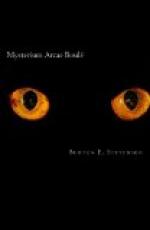“So, of course, he will go,” I commented, smiling.
“He certainly will,” assented Godfrey seriously, “and that before long. But meanwhile it’s a little difficult for me, because his people don’t know which way to jump. Once he’s out, everything will be serene again.”
I wasn’t interested in Grady, so I came back to the case in hand.
“Look here, Godfrey,” I said, “if it wasn’t poison, what was it?”
“But it was poison.”
“Inserted at the hand?”
He nodded.
“Goldberger says there’s no poison known which could be used that way and which would act so quickly.”
“Goldberger is right in that,” agreed Godfrey; “but there’s a poison unknown that will—because it did.”
“It wasn’t a snake bite?”
“Oh, no; snake poison wouldn’t kill a man that quickly—not even a fer-de-lance. That fellow practically dropped where he was struck.”
“Then what was it?”
Godfrey was sitting erect again. He was not smiling now. His face was very stern.
“That is what I am going to find out, Lester,” he said; “that is the problem I’ve set myself to solve—and it’s a pretty one. There is one thing certain—that fellow was killed by some agency outside himself. In some way, a drop or two of poison was introduced into his blood by an instrument something like a hypodermic needle; and that poison was so powerful that almost instantly it caused paralysis of the heart. After all, that isn’t so remarkable as it might seem. The blood in the veins of the hand would be carried back to the heart in four or five seconds.”
“But you’ve already said there’s no poison so powerful as all that.”
“I said we didn’t know of any. I wouldn’t be so sure that Catherine de Medici didn’t.”
“What has Catherine de Medici to do with it?”
“Nothing—except that what has been done may always be done again. Those old stories are, no doubt, exaggerated; but it seems fairly certain that the Queen of Navarre was killed with a pair of poisoned gloves, the Duc d’Anjou with the scent of a poisoned rose, and the Prince de Porcian with the smoke of a poisoned lamp. This case isn’t as extraordinary as those.”
“No,” I agreed, and fell silent, shivering a little, for there is something horrible and revolting about the poisoner.
“After all,” went on Godfrey, at last, “there is one thing that neither you nor I nor any reasonable man can believe, and that is that this Frenchman came from heaven knows where—from Paris, perhaps—with Vantine’s address in his pocket, and hunted up the house and made his way into it simply to kill himself there. He had some other object, and he met his death while trying to accomplish it.”
“Have you found out who he is?”
“No; he’s not registered at any of the hotels; the French consul never heard of him; he belongs to none of the French societies; he’s not known in the French quarter. He seems to have dropped in from the clouds. We’ve cabled our Paris office to look him up; we may hear from there to-night. But even if we discover the identity of Theophile d’Aurelle, it won’t help us any.”




